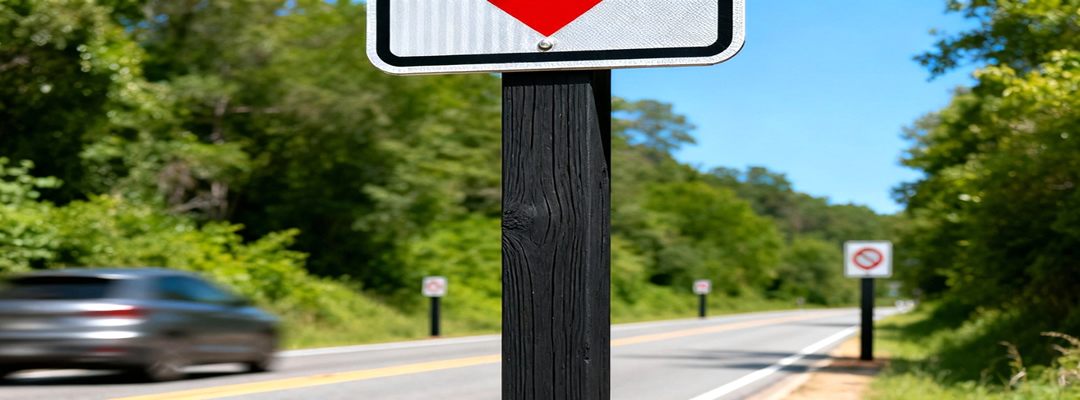Modern roads demand safer hardware and smarter materials. That’s why agencies are turning to plastic wood posts — supports made from recycled plastics that emulate the look of timber while outperforming it in durability and sustainability.
When paired with collapsible (breakaway) design, they help reduce crash severity and lower lifetime costs for traffic sign poles.
What are plastic wood posts?
Engineered from recycled plastics to replicate wood grain and color, plastic wood posts deliver a natural appearance without the typical drawbacks of timber. They don’t rot, split, or attract pests. They resist moisture, UV exposure, de‑icing salts, and coastal conditions.
The result is a long‑lasting, low‑maintenance solution that keeps corridors consistent in both performance and aesthetics — especially valuable for networks standardizing traffic sign poles across diverse climates.
Why collapsible design elevates safety
A rigid post can become a hazard in a crash. Collapsible (breakaway) posts are designed to absorb and dissipate kinetic energy, bending or detaching in a controlled way to reduce forces on vehicle occupants and vulnerable road users.
This passive‑safety approach supports Vision Zero‑style goals while maintaining everyday structural stability.
- Built‑in protection: Controlled energy absorption helps reduce crash severity.
- Predictable behavior: Consistent performance across common impact scenarios.
- Operational efficiency: Simplified field replacement minimizes lane closures and downtime.
Combined with the material advantages of plastic wood posts, agencies get safer corridors without sacrificing durability or code compliance.
Certifications that prove quality
Public procurement relies on verifiable credentials. Leading recycled, wood‑like supports for traffic sign poles carry independent certifications that validate safety, sustainability, and manufacturing rigor:
- CE mark (European quality) — Conformity with EU safety, health, and environmental protection standards.
- ABNT Green Seal (recognized by GEN) — Proven sustainable practices and product performance under robust criteria.
- Low CO₂ Emission Seal — Demonstrated reduction of greenhouse‑gas footprint across production and lifecycle.
- Bureau Veritas Carbon Footprint Seal — Third‑party validation of carbon reductions and eco‑efficient manufacturing.
These seals give specifiers confidence that plastic wood posts meet demanding compliance and sustainability expectations in real‑world deployments.
Advantages over traditional materials
Legacy options — galvanized steel and treated wood — carry known risks: corrosion, warping, cracking, and recurring maintenance. Plastic wood posts solve these pain points while enhancing safety and aesthetics.
- Weatherproof durability: High resistance to moisture, UV, freeze‑thaw cycles, and road chemicals.
- Lower total cost of ownership: Fewer repainting, sealing, and replacement cycles over the asset’s life.
- Consistent curb appeal: Wood‑like look without staining, splitting, or color drift.
- Sustainability with impact: Recycled content extends material lifecycles and diverts waste from landfills.
- Installation flexibility: Compatibility with standard hardware streamlines field work and replacements.
Specifying with confidence
To maximize outcomes, align specs with three essentials:
- Material quality: High recycled content and consistent mechanical properties for local wind loads.
- Passive safety: Documented collapsible performance across relevant impact scenarios.
- Lifecycle economics: Evaluate total ownership cost—not just unit price—covering installation, maintenance, and replacement.
Ready to upgrade your network?
If you’re seeking plastic wood posts and safer, greener traffic sign poles backed by recognized certifications, explore solutions that combine recycled content with collapsible design.
At the forefront of these technologies, Ecoposte can help you specify the right configuration for your roads and budget. Contact Ecoposte to learn more or request a quote.

